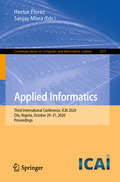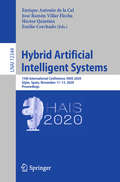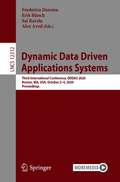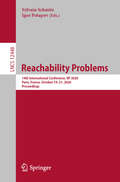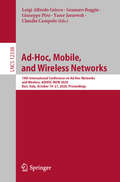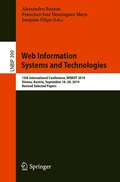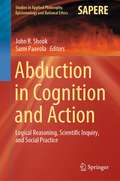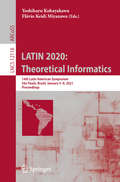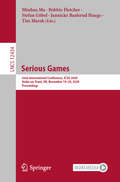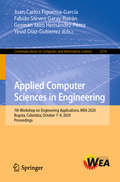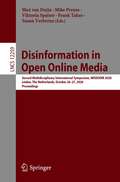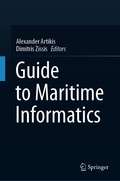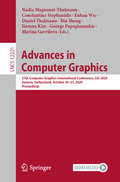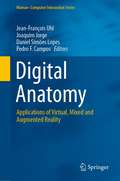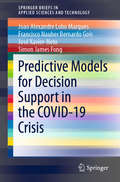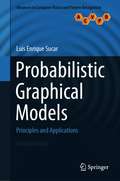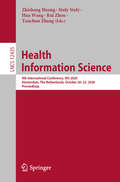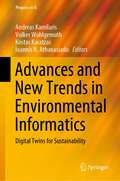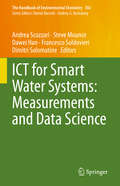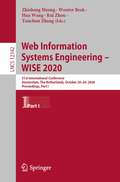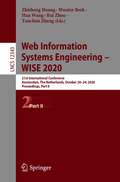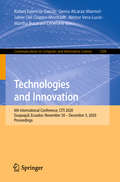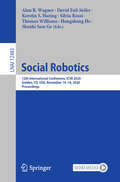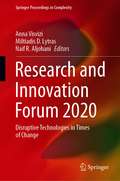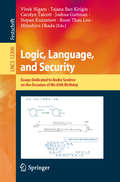- Table View
- List View
Applied Informatics: Third International Conference, ICAI 2020, Ota, Nigeria, October 29–31, 2020, Proceedings (Communications in Computer and Information Science #1277)
by Hector Florez Sanjay MisraThis book constitutes the thoroughly refereed papers of the Second International Conference on Applied Informatics, ICAI 2020, held in Ota, Nigeria, in October 2020. The 35 full papers were carefully reviewed and selected from 101 submissions. The papers are organized in topical sections on artificial intelligence; business process management; cloud computing; data analysis; decision systems; health care information systems; human-computer interaction; image processing; learning management systems; software design engineering.
Hybrid Artificial Intelligent Systems: 15th International Conference, HAIS 2020, Gijón, Spain, November 11-13, 2020, Proceedings (Lecture Notes in Computer Science #12344)
by Enrique Antonio de la Cal José Ramón Villar Flecha Héctor Quintián Emilio CorchadoThis book constitutes the refereed proceedings of the 15th International Conference on Hybrid Artificial Intelligent Systems, HAIS 2020, held in Gijón, Spain, in November 2020. The 65 regular papers presented in this book were carefully reviewed and selected from 106 submissions. The papers are grouped into these topics: advanced data processing and visualization techniques; bio-inspired models and optimization; learning algorithms; data mining, knowledge discovery and big data; and hybrid artificial intelligence applications.
Dynamic Data Driven Application Systems: Third International Conference, DDDAS 2020, Boston, MA, USA, October 2-4, 2020, Proceedings (Lecture Notes in Computer Science #12312)
by Sai Ravela Erik Blasch Alex Aved Frederica DaremaThis book constitutes the refereed proceedings of the Third International Conference on Dynamic Data Driven Application Systems, DDDAS 2020, held in Boston, MA, USA, in October 2020. The 21 full papers and 14 short papers presented in this volume were carefully reviewed and selected from 40 submissions. They cover topics such as: digital twins; environment cognizant adaptive-planning systems; energy systems; materials systems; physics-based systems analysis; imaging methods and systems; and learning systems.
Reachability Problems: 14th International Conference, RP 2020, Paris, France, October 19–21, 2020, Proceedings (Lecture Notes in Computer Science #12448)
by Sylvain Schmitz Igor PotapovThis book constitutes the refereed proceedings of the 14th International Conference on Reachability Problems, RP 2020, held in Paris, France in October 2020.The 8 full papers presented were carefully reviewed and selected from 25 submissions. In addition, 2 invited papers were included in this volume. The papers cover topics such as reachability for infinite state systems; rewriting systems; reachability analysis in counter/timed/cellular/communicating automata; Petri nets; computational aspects of semigroups, groups, and rings; reachability in dynamical and hybrid systems; frontiers between decidable and undecidable reachability problems; complexity and decidability aspects; predictability in iterative maps; and new computational paradigms.
Ad-Hoc, Mobile, and Wireless Networks: 19th International Conference on Ad-Hoc Networks and Wireless, ADHOC-NOW 2020, Bari, Italy, October 19–21, 2020, Proceedings (Lecture Notes in Computer Science #12338)
by Luigi Alfredo Grieco Gennaro Boggia Giuseppe Piro Yaser Jararweh Claudia CampoloThis book constitutes the refereed proceedings of the 19th International Conference on Ad-Hoc, Mobile, and Wireless Networks, ADHOC-NOW 2020, held in Bari, Italy, in October 2020.*The 19 full and 4 short papers presented were carefully reviewed and selected from 39 submissions. The papers provide an in-depth and stimulating view on the new frontiers in the field of mobile, ad hoc and wireless computing. They are organized in the following topical sections: intelligent, programmable and delay- and disruption- tolerant networks; internet of drones and smart mobility; internet of things and internet of medical things; secure communication protocols and architectures; and wireless systems. *The conference was held virtually due to the COVID-19 pandemic.
Web Information Systems and Technologies: 15th International Conference, WEBIST 2019, Vienna, Austria, September 18–20, 2019, Revised Selected Papers (Lecture Notes in Business Information Processing #399)
by Joaquim Filipe Alessandro Bozzon José Francisco Domínguez MayoThis book constitutes revised selected papers from the 15th International Conference on Web Information Systems and Technologies, WEBIST 20109 held in Vienna, Austria, in September 2019. The 10 full papers presented in this volume were carefully reviewed and selected from originally 87 paper submissions. They contribute to the understanding of relevant trends of current research on Web Information Systems and Technologies, including Big Data and Connected Services; Web Performance; Context-aware and Adaptive Web Applications; Human Robot Collaboration and Multi-Agent Systems; Web Application Operating Systems and Platforms; Social Media Advertising and Enhancing Purchase Intentions; Natural Language Query Interfaces and Semantic Web; and Human-computer Interaction and Dynamic Web Pages.
Abduction in Cognition and Action: Logical Reasoning, Scientific Inquiry, and Social Practice (Studies in Applied Philosophy, Epistemology and Rational Ethics #59)
by John R. Shook Sami PaavolaThis book gathers together novel essays on the state-of-the-art research into the logic and practice of abduction. In many ways, abduction has become established and essential to several fields, such as logic, cognitive science, artificial intelligence, philosophy of science, and methodology. In recent years this interest in abduction’s many aspects and functions has accelerated. There are evidently several different interpretations and uses for abduction. Many fundamental questions on abduction remain open. How is abduction manifested in human cognition and intelligence? What kinds or types of abduction can be discerned? What is the role for abduction in inquiry and mathematical discovery? The chapters aim at providing answer to these and other current questions. Their contributors have been at the forefront of discussions on abduction, and offer here their updated approaches to the issues that they consider central to abduction’s contemporary relevance. The book is an essential reading for any scholar or professional keeping up with disciplines impacted by the study of abductive reasoning, and its novel development and applications in various fields.
LATIN 2020: 14th Latin American Symposium, São Paulo, Brazil, January 5-8, 2021, Proceedings (Lecture Notes in Computer Science #12118)
by Yoshiharu Kohayakawa Flávio Keidi MiyazawaThis book constitutes the refereed proceedings of the 14th Latin American Symposium on Theoretical Informatics, LATIN 2020, held in Sao Paulo, Brazil, in January 2021. The 50 full papers presented in this book were carefully reviewed and selected from 136 submissions. The papers are grouped into these topics: approximation algorithms; parameterized algorithms; algorithms and data structures; computational geometry; complexity theory; quantum computing; neural networks and biologically inspired computing; randomization; combinatorics; analytic and enumerative combinatorics; graph theory.Due to the Corona pandemic the event was postponed from May 2020 to January 2021.
Serious Games: Joint International Conference, JCSG 2020, Stoke-on-Trent, UK, November 19–20, 2020, Proceedings (Lecture Notes in Computer Science #12434)
by Minhua Ma Bobbie Fletcher Stefan Göbel Jannicke Baalsrud Hauge Tim MarshThis book constitutes the refereed proceedings of the 6th Joint International Conference on Serious Games, JCSG 2020, held in Stoke-on-Trent, UK, in November 2020. The 19 full papers presented together with 3 short papers were carefully reviewed and selected from 38 submissions. The papers offer a wide range in the use of serious games in several fields like learning, simulation, training, health, well-being, management, assessment or marketing and much more.
Applied Computer Sciences in Engineering: 7th Workshop on Engineering Applications, WEA 2020, Bogota, Colombia, October 7–9, 2020, Proceedings (Communications in Computer and Information Science #1274)
by Juan Carlos Figueroa-García Fabián Steven Garay-Rairán Germán Jairo Hernández-Pérez Yesid Díaz-GutierrezThis volume constitutes the refereed proceedings of the 7th Workshop on Engineering Applications, WEA 2020, held in Bogota, Colombia, in October 2020.The 32 revised full papers and 12 short papers presented in this volume were carefully reviewed and selected from 136 submissions. The papers are organized in the following topical sections: computational intelligence; computer science; optimization; bioengineering; military applications; simulation, IoT and networks; power applications.
Disinformation in Open Online Media: Second Multidisciplinary International Symposium, MISDOOM 2020, Leiden, The Netherlands, October 26–27, 2020, Proceedings (Lecture Notes in Computer Science #12259)
by Mike Preuss Max Van Duijn Viktoria Spaiser Frank Takes Suzan VerberneThis book constitutes the refereed proceedings of the Second Multidisciplinary International Symposium, MISDOOM 2020, held in Leiden, The Netherlands, in October 2020.* The 18 full papers were carefully reviewed and selected from 23 submissions. The papers deal with the interdisciplinary field of computational social science, and in particular with the automated detection and combat of misinformation using modern techniques from machine learning, text mining, and social network analysis. * The conference was held virtually due to the COVID-19 pandemic. Chapters “Identifying Political Sentiments on YouTube: A Systematic Comparison regarding the Accuracy of Recurrent Neural Network and Machine Learning Models” and “Do Online Trolling Strategies Differ in Political and Interest Forums: Early Results” are available open access under a Creative Commons Attribution 4.0 International License via link.springer.com.
Guide to Maritime Informatics
by Alexander Artikis Dimitris ZissisIn the last 25 years, information systems have had a disruptive effect on society and business. Up until recently though, the majority of passengers and goods were transported by sea in many ways similar to the way they were at the turn of the previous century. Gradually, advanced information technologies are being introduced, in an attempt to make shipping safer, greener, more efficient, and transparent. The emerging field of Maritime Informatics studies the application of information technology and information systems to maritime transportation.Maritime Informatics can be considered as both a field of study and domain of application. As an application domain, it is the outlet of innovations originating from data science and artificial intelligence; as a field of study, it is positioned between computer science and marine engineering. This new field’s complexity lies within this duality because it is faced with disciplinary barriers yet demands a systemic, transdisciplinary approach. At present, there is a growing body of knowledge that remains undocumented in a single source or textbook designed to assist students and practitioners.This highly useful textbook/reference starts by introducing required knowledge, algorithmic approaches, and technical details, before presenting real-world applications. The aim is to present interested audiences with an overview of the main technological innovations having a disruptive effect on the maritime industry, as well as to discuss principal ideas, methods of operation and applications, and future developments. The material in this unique volume provides requisite core knowledge for undergraduate or postgraduate students, employing an analytical approach with numerous real-world examples and case studies.
Advances in Computer Graphics: 37th Computer Graphics International Conference, CGI 2020, Geneva, Switzerland, October 20–23, 2020, Proceedings (Lecture Notes in Computer Science #12221)
by Nadia Magnenat-Thalmann Constantine Stephanidis Enhua Wu Daniel Thalmann Bin Sheng Jinman Kim George Papagiannakis Marina GavrilovaThis book constitutes the refereed proceedings of the 37th Computer Graphics International Conference, CGI 2020, held in Geneva, Switzerland, in October 2020. The conference was held virtually. The 43 full papers presented together with 3 short papers were carefully reviewed and selected from 189 submissions. The papers address topics such as: virtual reality; rendering and textures; augmented and mixed reality; video processing; image processing; fluid simulation and control; meshes and topology; visual simulation and aesthetics; human computer interaction; computer animation; geometric computing; robotics and vision; scientific visualization; and machine learning for graphics.
Digital Anatomy: Applications of Virtual, Mixed and Augmented Reality (Human–Computer Interaction Series)
by Jean-François Uhl Joaquim Jorge Daniel Simões Lopes Pedro F. CamposThis book offers readers fresh insights on applying Extended Reality to Digital Anatomy, a novel emerging discipline. Indeed, the way professors teach anatomy in classrooms is changing rapidly as novel technology-based approaches become ever more accessible. Recent studies show that Virtual (VR), Augmented (AR), and Mixed-Reality (MR) can improve both retention and learning outcomes. Readers will find relevant tutorials about three-dimensional reconstruction techniques to perform virtual dissections. Several chapters serve as practical manuals for students and trainers in anatomy to refresh or develop their Digital Anatomy skills. We developed this book as a support tool for collaborative efforts around Digital Anatomy, especially in distance learning, international and interdisciplinary contexts. We aim to leverage source material in this book to support new Digital Anatomy courses and syllabi in interdepartmental, interdisciplinary collaborations. Digital Anatomy – Applications of Virtual, Mixed and Augmented Reality provides a valuable tool to foster cross-disciplinary dialogues between anatomists, surgeons, radiologists, clinicians, computer scientists, course designers, and industry practitioners. It is the result of a multidisciplinary exercise and will undoubtedly catalyze new specialties and collaborative Master and Doctoral level courses world-wide. In this perspective, the UNESCO Chair in digital anatomy was created at the Paris Descartes University in 2015 (www.anatomieunesco.org). It aims to federate the education of anatomy around university partners from all over the world, wishing to use these new 3D modeling techniques of the human body.
Predictive Models for Decision Support in the COVID-19 Crisis (SpringerBriefs in Applied Sciences and Technology)
by Joao Alexandre Marques Francisco Nauber Gois José Xavier-Neto Simon James FongCOVID-19 has hit the world unprepared, as the deadliest pandemic of the century. Governments and authorities, as leaders and decision makers fighting the virus, enormously tap into the power of artificial intelligence and its predictive models for urgent decision support. This book showcases a collection of important predictive models that used during the pandemic, and discusses and compares their efficacy and limitations. Readers from both healthcare industries and academia can gain unique insights on how predictive models were designed and applied on epidemic data. Taking COVID19 as a case study and showcasing the lessons learnt, this book will enable readers to be better prepared in the event of virus epidemics or pandemics in the future.
Probabilistic Graphical Models: Principles and Applications (Advances in Computer Vision and Pattern Recognition)
by Luis Enrique SucarThis fully updated new edition of a uniquely accessible textbook/reference provides a general introduction to probabilistic graphical models (PGMs) from an engineering perspective. It features new material on partially observable Markov decision processes, graphical models, and deep learning, as well as an even greater number of exercises.The book covers the fundamentals for each of the main classes of PGMs, including representation, inference and learning principles, and reviews real-world applications for each type of model. These applications are drawn from a broad range of disciplines, highlighting the many uses of Bayesian classifiers, hidden Markov models, Bayesian networks, dynamic and temporal Bayesian networks, Markov random fields, influence diagrams, and Markov decision processes.Topics and features:Presents a unified framework encompassing all of the main classes of PGMsExplores the fundamental aspects of representation, inference and learning for each techniqueExamines new material on partially observable Markov decision processes, and graphical modelsIncludes a new chapter introducing deep neural networks and their relation with probabilistic graphical models Covers multidimensional Bayesian classifiers, relational graphical models, and causal modelsProvides substantial chapter-ending exercises, suggestions for further reading, and ideas for research or programming projectsDescribes classifiers such as Gaussian Naive Bayes, Circular Chain Classifiers, and Hierarchical Classifiers with Bayesian NetworksOutlines the practical application of the different techniquesSuggests possible course outlines for instructorsThis classroom-tested work is suitable as a textbook for an advanced undergraduate or a graduate course in probabilistic graphical models for students of computer science, engineering, and physics. Professionals wishing to apply probabilistic graphical models in their own field, or interested in the basis of these techniques, will also find the book to be an invaluable reference.Dr. Luis Enrique Sucar is a Senior Research Scientist at the National Institute for Astrophysics, Optics and Electronics (INAOE), Puebla, Mexico. He received the National Science Prize en 2016.
Health Information Science: 9th International Conference, HIS 2020, Amsterdam, The Netherlands, October 20–23, 2020, Proceedings (Lecture Notes in Computer Science #12435)
by Zhisheng Huang Siuly Siuly Hua Wang Rui Zhou Yanchun ZhangThis book constitutes the proceedings of the 9th International Conference on Health Information Science, HIS 2020, which took place in Amsterdam, The Netherlands, during October 20-23, 2020. The 11 full papers and 6 short papers presented in this volume were carefully reviewed and selected from 62 submissions. They were organized in topical sections named: mental health; medical record processing; medical information systems; medical diagnosis with machine learning; and health behavior and medication.
Advances and New Trends in Environmental Informatics: Digital Twins for Sustainability (Progress in IS)
by Volker Wohlgemuth Kostas Karatzas Ioannis N. Athanasiadis Andreas KamilarisThis book is an outcome of the 34th International Conference EnviroInfo 2020, hosted virtually in Nicosia, Cyprus by the Research Centre on Interactive Media, Smart Systems and Emerging Technologies (RISE). It presents a selection of papers that describe innovative scientific approaches and ongoing research in environmental informatics and the emerging field of environmental sustainability, promoted and facilitated by the use of information and communication technologies (ICT). The respective articles cover a broad range of scientific aspects including advances in core environmental informatics-related technologies such as earth observation, environmental modelling, big data and machine learning, robotics, smart agriculture and food solutions, renewable energy-based solutions, optimization of infrastructures, sustainable industrial processes, and citizen science, as well as applications of ICT solutions intended to support societal transformation processes toward the more sustainable management of resource use, transportation and energy supplies. Given its scope, the book is essential reading for scientists, experts and students in these fields of research.
ICT for Smart Water Systems: Measurements and Data Science (The Handbook of Environmental Chemistry #102)
by Andrea Scozzari Steve Mounce Dawei Han Francesco Soldovieri Dimitri SolomatineToday, Information and Communication Technologies (ICT) have a pervasive presence in almost every aspect of the management of water. There is no question that the collection of big data from sensing and the insights gained by smart analytics can bring massive benefits. This book focuses on new perspectives for the monitoring, assessment and control of water systems, based on tools and concepts originating from the ICT sector. It presents a portrait of up-to-date sensing techniques for water, and introduces concepts and implications with the analysis of the acquired data. Particular attention is given to the advancements in developing novel devices and data processing approaches. The chapters guide the reader through multiple disciplinary contexts, without aiming to be exhaustive, but with the effort to present relevant topics in such a highly multi-disciplinary framework. This book will be of interest to advanced students, researchers and stakeholders at various levels.
Web Information Systems Engineering – WISE 2020: 21st International Conference, Amsterdam, The Netherlands, October 20–24, 2020, Proceedings, Part I (Lecture Notes in Computer Science #12342)
by Yanchun Zhang Hua Wang Rui Zhou Zhisheng Huang Wouter BeekThis book constitutes the proceedings of the 21st International Conference on Web Information Systems Engineering, WISE 2020, held in Amsterdam, The Netherlands, in October 2020.The 81 full papers presented were carefully reviewed and selected from 190 submissions. The papers are organized in the following topical sections: Part I: network embedding; graph neural network; social network; graph query; knowledge graph and entity linkage; spatial temporal data analysis; and service computing and cloud computing Part II: information extraction; text mining; security and privacy; recommender system; database system and workflow; and data mining and applications
Web Information Systems Engineering – WISE 2020: 21st International Conference, Amsterdam, The Netherlands, October 20–24, 2020, Proceedings, Part II (Lecture Notes in Computer Science #12343)
by Yanchun Zhang Hua Wang Rui Zhou Zhisheng Huang Wouter BeekThis book constitutes the proceedings of the 21st International Conference on Web Information Systems Engineering, WISE 2020, held in Amsterdam, The Netherlands, in October 2020.The 81 full papers presented were carefully reviewed and selected from 190 submissions. The papers are organized in the following topical sections: Part I: network embedding; graph neural network; social network; graph query; knowledge graph and entity linkage; spatial temporal data analysis; and service computing and cloud computing Part II: information extraction; text mining; security and privacy; recommender system; database system and workflow; and data mining and applications
Technologies and Innovation: 6th International Conference, CITI 2020, Guayaquil, Ecuador, November 30 – December 3, 2020, Proceedings (Communications in Computer and Information Science #1309)
by Rafael Valencia-García Gema Alcaraz-Marmol Javier Del Cioppo-Morstadt Néstor Vera-Lucio Martha Bucaram-LeveroneThis book constitutes the proceedings of the 6th International Conference on Technologies and Innovation, CITI 2020, held in Guayaquil, Ecuador, in November-December 2020.The 16 full papers presented in this volume were carefully reviewed and selected from 41 submissions. They are organized in topical sections named: semantic technologies and machine learning; ICT for agronomy and environment; mobile and collaborative technologies.
Social Robotics: 12th International Conference, ICSR 2020, Golden, CO, USA, November 14–18, 2020, Proceedings (Lecture Notes in Computer Science #12483)
by Alan R. Wagner David Feil-Seifer Kerstin S. Haring Silvia Rossi Thomas Williams Hongsheng He Shuzhi Sam GeThis book constitutes the refereed proceedings of the 12th International Conference on Social Robotics, ICSR 2020, held in Golden, CO, USA, in November 2020. The conference was held virtually.The 57 full papers presented were carefully reviewed and selected from 101 submissions. The theme of the 2020 conference is Entertaining Robots. The papers focus on the following topics: human-robot trust and human-robot teaming, robot understanding and following of social and moral norms, physical and interaction design of social robots, verbal and nonverbal robot communication, interactive robot learning, robot motion and proxemics, and robots in domains such as education and healthcare.
Research and Innovation Forum 2020: Disruptive Technologies in Times of Change (Springer Proceedings in Complexity)
by Anna Visvizi Miltiadis D. Lytras Naif R. AljohaniThis book features research presented and discussed during the Research & Innovation Forum (Rii Forum) 2020. As such, this book offers a unique insight into emerging topics, issues and developments pertinent to the fields of technology, innovation and education and their social impact. Papers included in this book apply inter- and multi-disciplinary approaches to query such issues as technology-enhanced teaching and learning, smart cities, information systems, cognitive computing and social networking. What brings these threads of the discussion together is the question of how advances in computer science – which are otherwise largely incomprehensible to researchers from other fields – can be effectively translated and capitalized on so as to make them beneficial for society as a whole. In this context, Rii Forum and Rii Forum proceedings offer an essential venue where diverse stakeholders, including academics, the think tank sector and decision-makers, can engage in a meaningful dialogue with a view to improving the applicability of advances in computer science.
Logic, Language, and Security: Essays Dedicated to Andre Scedrov on the Occasion of His 65th Birthday (Lecture Notes in Computer Science #12300)
by Vivek Nigam Tajana Ban Kirigin Carolyn Talcott Joshua Guttman Stepan Kuznetsov Boon Thau Loo Mitsuhiro OkadaThis Festschrift was published in honor of Andre Scedrov on the occasion of his 65th birthday. The 11 technical papers and 3 short papers included in this volume show the many transformative discoveries made by Andre Scedrov in the areas of linear logic and structural proof theory; formal reasoning for networked systems; and foundations of information security emphasizing cryptographic protocols. These papers are authored by researchers around the world, including North America, Russia, Europe, and Japan, that have been directly or indirectly impacted by Andre Scedrov. The chapter “A Small Remark on Hilbert's Finitist View of Divisibility and Kanovich-Okada-Scedrov's Logical Analysis of Real-Time Systems” is available open access under a CC BY 4.0 license at link.springer.com.
